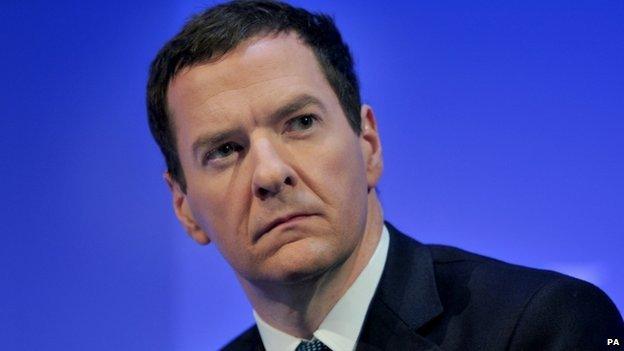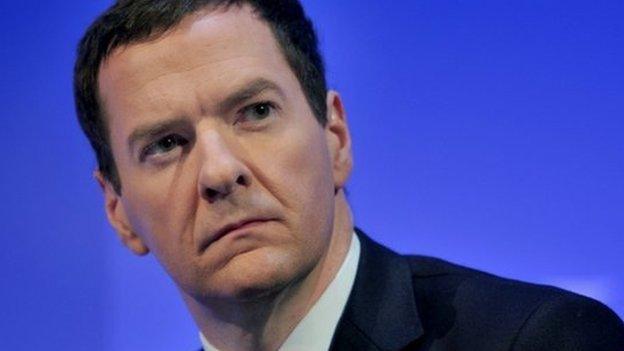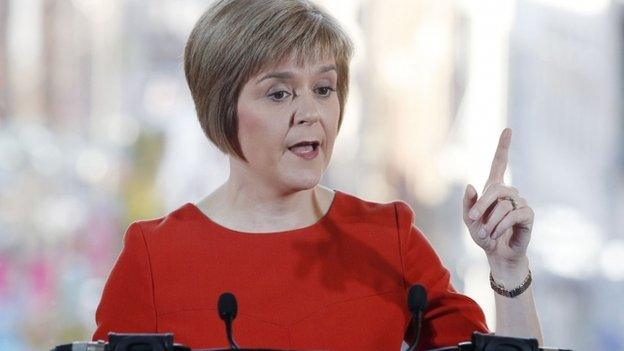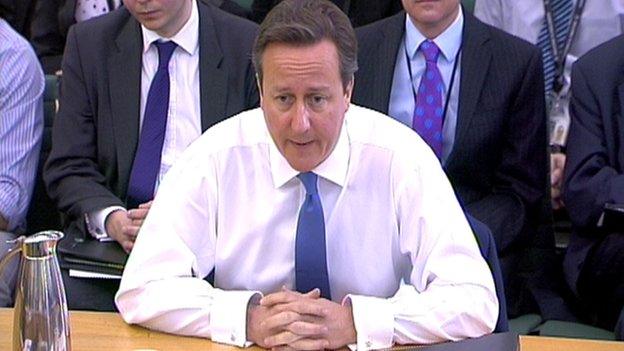Corporation tax: Sinn Féin in 'Tory policies' warning
- Published

The chancellor made the announcement in the House of Commons as part of his Autumn Statement
Sinn Féin has said it will not agree to the transfer of corporation tax to Northern Ireland "on the basis of implementing Tory policies".
First Minister Peter Robinson has blamed the delay in transferring powers on Sinn Féin and the SDLP's failure to agree a deal on welfare reform.
Earlier, Chancellor George Osborne said devolving the powers would depend on the outcome of Northern Ireland talks.
He said NI parties had to show they can "manage the financial implications".
Sinn Féin's Daithí McKay said his party won't agree to the powers on the basis of implementing Tory cuts
However, Sinn Féin's Daithí McKay said: "We are not going to agree to the transfer of corporation tax or any other power on the basis of implementing Tory policies.
"We need a serious contribution from the Tory party, from the British government, and we need to ensure that not only corporation tax, but other fiscal powers, are transferred as well to ensure that we can maximise job creation and maximise opportunities in terms of the local assembly."
Earlier, Northern Ireland's first minister, Mr Robinson, welcomed the approval "in principle" from the chancellor and said it was the "failure of the other parties" that had caused the delay.
Theresa Villiers said parties must resolve their budget dispute issues before corporation tax powers are dissolved
"Let us be clear. If Sinn Féin and the SDLP had been prepared to agree the DUP enhanced welfare reform proposal and if the SDLP, UUP and Alliance had been sufficiently mature to take the difficult decision to support the draft budget we would have been moving to legislate for corporation tax powers to be devolved on Monday," he said.
"If this opportunity is lost they will have to explain why they failed to behave in the best interests of our people and why they have rejected the opportunity to create up to an additional 50,000 jobs here."
In his Autumn Statement to parliament, Mr Osborne said: "We recognise the strongly held arguments for devolving corporation tax setting powers to Northern Ireland.
"The Treasury believes it can be implemented provided the Northern Ireland Executive can show that it is able to manage the financial implications. The current talks will see if that's the case.
"And if it is, the government will introduce legislation in this parliament. "

Analysis by John Campbell, BBC News NI Economics Editor
"Like Waiting for Godot" is what a senior business figure told me about today's announcement from the Chancellor.
There is satisfaction among campaigners that the argument for devolving the tax has been won and that it is now seen as practically possible.
But the latest delay, which clearly ties the power to the fate of the all-party talks, causes huge unease.
What exactly will the parties have to do to convince the Chancellor?
"A cynic might say this is a way to make sure it never happens," my source added.
He will be hoping that the Waiting for Godot analogy is not followed to its conclusion.
In the Beckett play Godot said he would come "surely tomorrow." But he never turned up.

Corporation tax is what companies pay on their profits.
At the moment, it is levied at a rate of 21% in the UK, although that will be coming down to 20% in April.
In the Republic of Ireland, the rate is just 12.5% which makes it more competitive than Northern Ireland when it comes to attracting foreign investment.
Supporters of devolution said tax-cutting powers would give a major boost to Northern Ireland's economy, but sceptics said it would hit public spending with no guarantee of success.
Welfare reform
The Northern Ireland inter-party talks, chaired by Secretary of State Teresa Villiers, are aimed at reaching agreement on a range of unresolved issues, including disputes over flags, parades, the legacy of the Troubles and welfare reform.
The five main parties have clashed over welfare reform in recent months, with Sinn Féin and the SDLP objecting many of the cost-cutting measures that have already come into force in England and Wales.
Unionists have argued that Northern Ireland must take difficult decisions to balance its budget, but nationalist and republican MLAs have said that many of the reforms will disproportionately disadvantage some of the most vulnerable people in society.
- Published3 December 2014

- Published3 December 2014
- Published8 January 2015

- Published2 December 2014
- Published2 December 2014

- Published20 November 2014

- Published30 November 2014
